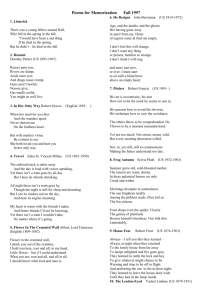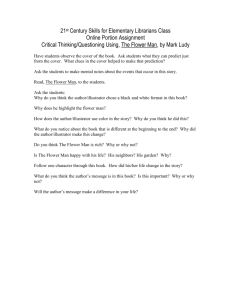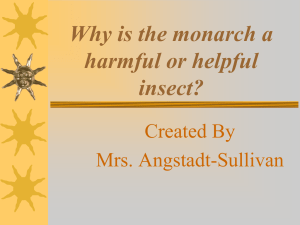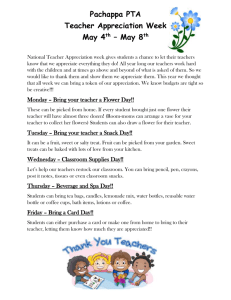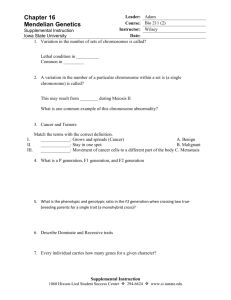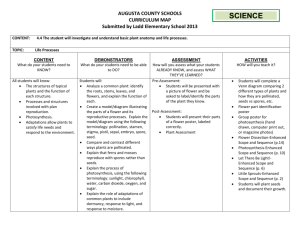Shared Reading Parts of a Flower Exemplar Lesson
advertisement
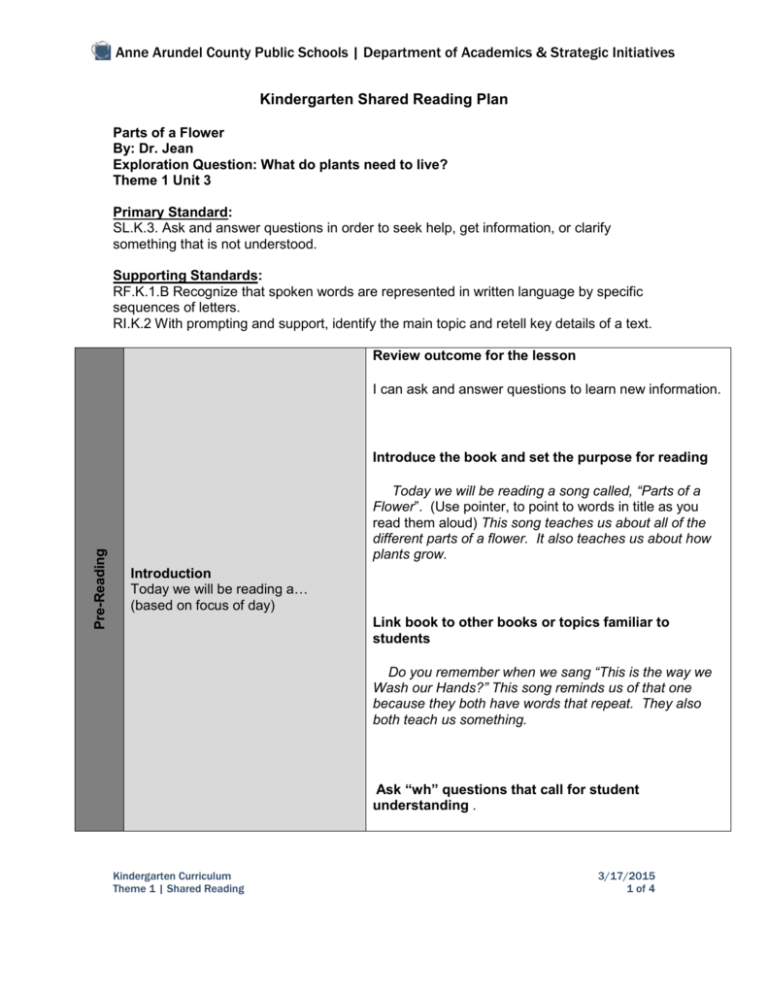
Anne Arundel County Public Schools | Department of Academics & Strategic Initiatives Kindergarten Shared Reading Plan Parts of a Flower By: Dr. Jean Exploration Question: What do plants need to live? Theme 1 Unit 3 Primary Standard: SL.K.3. Ask and answer questions in order to seek help, get information, or clarify something that is not understood. Supporting Standards: RF.K.1.B Recognize that spoken words are represented in written language by specific sequences of letters. RI.K.2 With prompting and support, identify the main topic and retell key details of a text. Review outcome for the lesson I can ask and answer questions to learn new information. Pre-Reading Introduce the book and set the purpose for reading Today we will be reading a song called, “Parts of a Flower”. (Use pointer, to point to words in title as you read them aloud) This song teaches us about all of the different parts of a flower. It also teaches us about how plants grow. Introduction Today we will be reading a… (based on focus of day) Link book to other books or topics familiar to students Do you remember when we sang “This is the way we Wash our Hands?” This song reminds us of that one because they both have words that repeat. They also both teach us something. Ask “wh” questions that call for student understanding . Kindergarten Curriculum Theme 1 | Shared Reading 3/17/2015 1 of 4 Anne Arundel County Public Schools | Department of Academics & Strategic Initiatives When you look at this flower (show picture and/or actual flower), what are some different parts that you see? Students will recognize words that repeat often in the song: and, a, it, is (RF.K.1.b) Word Work High frequency words and/or sound patterns needed to read the text with fluency Vocabulary Vocabulary Word (location in text): Choose a word that holds meaning in the text that a student must know to comprehend the story, but could not figure out through context, prior knowledge, or decoding DI/UDL Option #1 Frame each word, one a time, using a word framer. Or, index card with hole cut out approximately same size as the word. Once words are located students can practice writing the words in the air as they spell them aloud. DI/UDL Option #2 Use “Word Wall Chants” to spell each word. Have students use hand motions to represent each letter spelled in the word. Then a separate motion to orally state the whole word. (Example: basketball motions for “and”- students pretend to bounce a ball as they chorally say each letter, they then pretend to shoot the ball as the say the whole word. “A-N-D, and”) Suggested Vocabulary: flower, stem, leaves, roots “Today we will find some words in the song that are important to understanding the song. One of these words is _____. (Point to the word with your pointer) Watch me read the word _____. Now say the word _____ with me. Invite students to come up and highlight (using highlighter tape or Smart Board technology) vocabulary words in the song. DI/UDL Option #1 Show diagram of a flower with arrows pointing to different parts. Have students match the word to the corresponding part of flower on chart paper, or using Smart Board technology. DI/UDL Option #2 Use clip art images to represent vocabulary words (flower parts). Invite students to match the picture with the word, and place image above word on Smart Board or chart paper. Comprehension Support Teaching points within this text level, focus on one or two items to address that benefit ALL students in the Kindergarten Curriculum Theme 1 | Shared Reading Listening Comprehension: Students read/sing the song to respond to a think aloud. When we read the song today, we will learn about the different parts of a flower, and how plants change as they grow. 3/17/2015 2 of 4 Anne Arundel County Public Schools | Department of Academics & Strategic Initiatives group (may be an unknown concept in the text) (RI.K.2) DI/UDL Option #1: Use a flow map and pictures of a flower starting as a seed, then growing into a seedling, a small plant, and then a plant with a flower. Have students work in pairs discuss the order in which to arrange the pictures on the flow map. DI/UDL Option #2: If a student is struggling with the concepts of plant parts vs. plant needs, have the student sort pictures using a tree map into plant parts/plant needs categories. DI/UDL Option #3: Use real life objects to demonstrate different plant parts. (flower=broccoli, stem=celery, leaves=spinach leaves, carrots=roots). Have students work in small groups to sort the objects into categories and discuss why they sorted that way. Students will read with attention to the song in order to ask and answer questions. During Reading Thinking Job Standard based question that sets students up to master the primary standard. This is what the student needs to be thinking/doing while reading. Set purpose for reading Reading Plan Plan for how the text will be read (teacher modeling, choral reading etc.) Kindergarten Curriculum Theme 1 | Shared Reading Let’s read/sing to find out about the different parts of a flower, and what plants need to help them grow. While we’re reading/ singing, we’re going to be pretending we are a plant, and pretend that our body parts are like the different parts of the plant. The teacher will model reading/singing the song and making motions as he/she reads. The teacher will read the first section, and model movements/motions. Students will echo the first section and practice making the movements/motions with the teacher. Once students have had the chance to practice, students will chorally read/sing and make motions with the teacher. (RI.K.2) DI/UDL Option: Students that are having difficulty reading/singing the song and doing motions at the same time can instead be given the option to point to the different parts of the flower on an individual copy of the diagram as he/she sings along. 3/17/2015 3 of 4 Anne Arundel County Public Schools | Department of Academics & Strategic Initiatives Teacher poses the following questions to students: What are some different parts of a plant? What are some things a flower needs to grow? How does a flower change as it grows? (SL.K.3 and RI.K.2) Invite students to turn and talk to develop a question they have about plant parts, how plants change as they grow, or what plants need to grow? Have students share questions, and allow other students to answer them. Unanswered questions can be recorded on a chart for later research. (SL.K.3) Post-Reading Discussion Questions Choose questions that support Common Core Standards from the grade level standards in which the book level falls to enhance comprehension of the text DI/UDL Option #1 Provide students with verbal cloze sentences if they are having difficulty developing a question of their own. (Example: “I wonder why a plant has a _______?” or “I wonder what would happen if a plant didn’t have ______?” Extension Suggestions DI/UDL Option #2 Provide students with short statements about plants (paired with pictures). Use some that are true, and some that are not true. Work together to sort the statements into categories (true and not true). Invite students to ask a partner to clarify if they are unsure. Model how to turn the statement into a question to seek clarification. (Example: If statement says, “Plants do not need sunshine to grow.” The student might ask the class, “Do plants need sunshine to grow?” Related Tasks Optional Extensions that may occur during the Literacy Centers/Guided Block or Developmental Centers Examples: Writing/drawing to source prompt, Arts Integration lesson, retell the story, sequence the story, create a Thinking Map, sketch a prediction, dramatize selection Kindergarten Curriculum Theme 1 | Shared Reading Plant seeds in class. Make predictions about how plants will grow. Invite students to draw pictures of a prediction of what the plant/flower will look like. Students can use targeted vocabulary words to label plant parts from drawings in their journals. Individuals can have the opportunity to show and describe their drawings/predictions on document cameras. Encourage classmates to ask clarifying questions about student predictions. (SL.K.3) 3/17/2015 4 of 4
